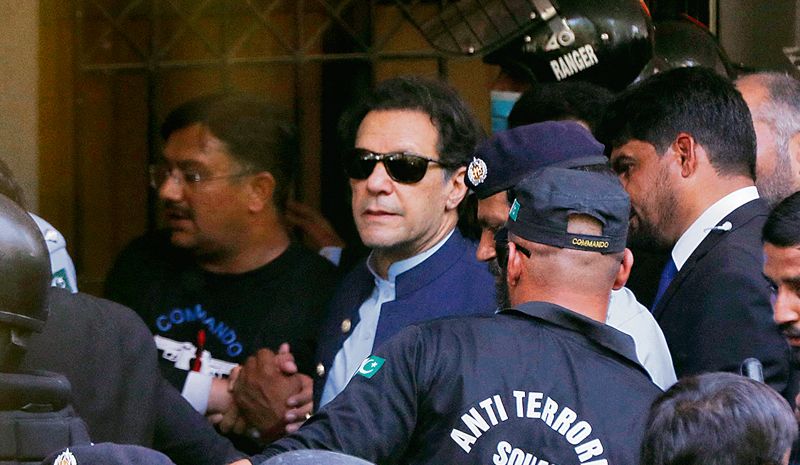

Advertisement
HAMARI Fauj Hamara Fakr (our army, our pride) is the slogan on one of the banners hanging in the busy streets of Karachi, Pakistan’s prime financial city, as the Pakistani establishment — a term colloquially used to refer to the Pakistani army — carries out its damage-control exercise after the embarrassing scenes of May 9. Ever since that episode, marked by rioting, including violence on the premises of army installations, the establishment has struck back, with thousands of political activists arrested.
First, it will be wrong to see the developments over the last few weeks as something of a revolt against the Pakistani army and a cry for civilian control. It is inherently a power struggle in which a former protege of the Pakistani army, ie former Prime Minister Imran Khan, has become a Frankenstein’s monster. The victimisation of Imran and his supporters is a replay of how he as the PM dealt with the then Opposition and critics. In view of the vicious verbal attacks by Imran against the Pakistani army leadership, the reaction of the deep state has been ruthless.
At the core of this saga is the ego tussle between current army chief Gen Asim Munir and Imran. It goes back to Gen Munir’s tenure as the ISI Director General (DG) when he had apprised the then PM Imran about the alleged corrupt dealings of his wife, which had resulted in his (DG’s) transfer.
Second, the power struggle comes in the background of a perceived politicisation of the judiciary. The 18th Amendment to the Pakistan Constitution, passed by the National Assembly on April 8, 2010, aimed to plug the structural anomalies that had arisen because of repeated military coups. It gave a semblance of federal autonomy to the provinces and the Eighth Amendment to the Constitution of Pakistan that gave the power to the President to dismiss any elected government was removed. The then ruling Pakistan People’s Party (PPP) leadership agreed to the passing of the 19th Amendment in December 2010, which diluted the power of the parliament to consider the conduct of judges and their appointments.Advertisement
Recently, Pakistan’s Foreign Minister Bilawal Bhutto Zardari informed the parliament that they had had to compromise in passing this provision. This was a hint to the fact that otherwise, the then Chief Justice Iftikhar Chaudhry may have declared the 18th Amendment as a negation of the basic structure of the constitution. In the ratifying body of the appointment of judges — the Judicial Commission of Pakistan — there is a six-judge majority in the nine-member commission. In this connection, Pakistan Muslim League-Nawaz (PML-N) leader Mariam Nawaz’s recent public utterances against Chief Justice Umar Ata Bandial after he allowed bail to Imran are not a surprise. Interestingly, the judge next in line to the post of chief justice is considered to be not to Imran’s liking.
Three, going by the social media metric, it may seem that Imran is invincible electorally. This may be true in a given context as apart from people being smitten by his celebrity appeal and the establishment of a premier cancer charitable hospital by him, a considerable percentage of the urban and semi-urban population is tired of baradari (caste-based) politics.
However, the PML-N’s control over Punjab, which is the most populous and electorally decisive province in Pakistan, cannot be underestimated. The prevalent structure of baradari politics in rural areas with a population of 70 million against 40 million in the urban areas of Punjab is a factor that cannot be ignored. In many contexts, across the world, we have seen that the social media metric and street power are not the same as the electoral strength on the ground. In this regard, the PML-N, founded in 1988, has considerable political capital as also skills to influence the verdict in Punjab. This was manifested in its recent political engagements with local actors such as the Chaudharys of the PML-Q (Quaid-e-Azam) in the Gujrat area of Punjab. The case of the PPP’s cadre in the non-Karachi area of Sindh is no different.Advertisement
Four, like in other parts of the Global South where the army is the predominant institution, the Pakistani army has mastered the art of machination required to thwart internal critics questioning its supremacy. It has launched a campaign to bring the “arsonists who attacked the civil and military installations to justice through trial under relevant laws, including the Pakistan Army Act and Official Secrets Act.”
The resignation of some senior leaders of the Pakistan Tehreek-e-Insaf (PTI) and the toning down of Imran’s tirade against the army leadership in the past few days indicate that these actions have had an effect.
Overall, the fundamentals of Pakistan’s internal polity remain as they were before May 9. This is also true of the external factors that possibly influence its polity. After he lost the no-confidence motion in parliament, Imran accused the Joe Biden administration of being instrumental in the ‘regime change’ as he had refused to give Pakistani airbases or airspace to the US for its counter-terrorism operations. There is no such grandstanding now. In fact, through various interviews and reported hiring of lobbyists in the US, efforts have been made to improve his ties with the Biden administration.Advertisementhttps://6e13fd6e218cff2a8feaa2db4b762de5.safeframe.googlesyndication.com/safeframe/1-0-40/html/container.html
India-bashing and Kashmir-related rhetoric are potent toolkits for politicians to increase their popularity in Pakistan. Imran is no different. In contrast to Imran’s allies, the current alliance partners — the PPP and PML-N — are experienced entities. They know that political will is not the only vector in the conciliation efforts with India as they involve heavy lifting on many fronts.
On the whole, the international community should be careful about perceiving the current power struggle in Pakistan as a fight for civilian supremacy. It is innately a classic tussle between powerful individuals and institutions that have become adept at selectively using the lexicon of democracy, rule of law and the Constitution to their advantage.
